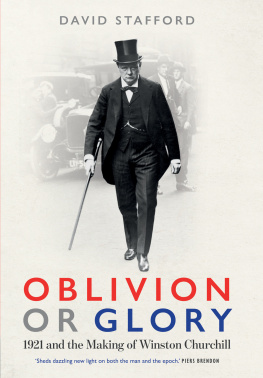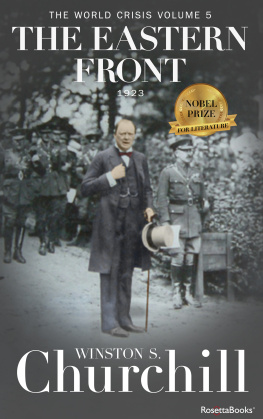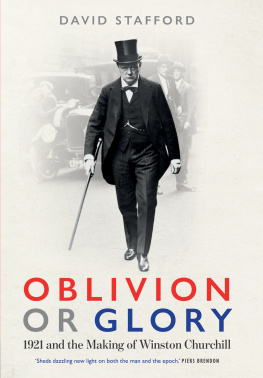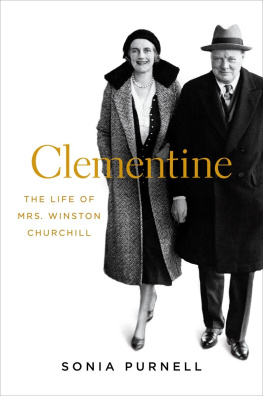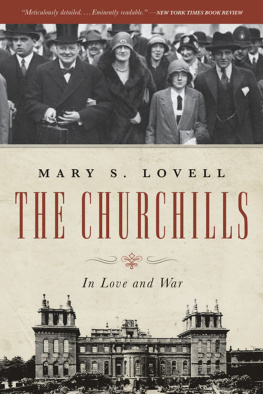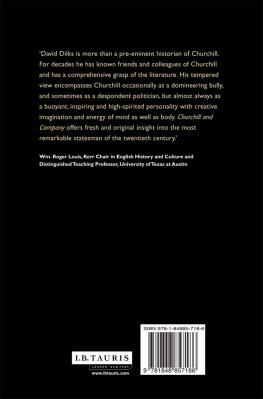OBLIVION OR GLORY

Copyright 2019 David Stafford
All rights reserved. This book may not be reproduced in whole or in part, in any form (beyond that copying permitted by Sections 107 and 108 of the U.S. Copyright Law and except by reviewers for the public press) without written permission from the publishers.
For information about this and other Yale University Press publications, please contact:
U.S. Office:
Europe Office:
Set in Minion Pro by IDSUK (DataConnection) Ltd
Printed in Great Britain by TJ International Ltd, Padstow, Cornwall
Library of Congress Control Number: 2019941061
ISBN 978-0-300-23404-6
A catalogue record for this book is available from the British Library.
10 9 8 7 6 5 4 3 2 1
For Jeanne
Midway along lifes journey
I found myself in a dark wood
and the path was lost...
Dante, Inferno, The Divine Comedy
CONTENTS
ILLUSTRATIONS
ACKNOWLEDGEMENTS
O ver several years writing about Churchill I have benefited greatly from discussions with many friends and colleagues too numerous to list here. For this book in particular, however, I wish to thank Paul Addison and Piers Brendon, as well as the anonymous readers who made helpful and constructive comments at various stages of the project. Heather McCallum of Yale University Press UK and my agent Andrew Lownie both showed encouraging faith in the project from the start and contributed with many valuable insights and suggestions. I am also grateful to Allen Packwood, Director of the Churchill Archive Centre at Churchill College, Cambridge, who helped facilitate my stay at the College as an Archives By-Fellow in 2016, and to members of his staff, especially Natalie Adams who guided me through its digital holdings and, along with Katharine Thomson, helped with my many enquiries. Cameron Hazlehurst generously shared information about Churchills first biographer, Alexander MacCallum Scott, as well as on The Other Club. In Scotland, staffs at the National Library of Scotland in Edinburgh and at the Dundee City Archives helped me track down useful references to Churchill and, as ever, the resources of the University of Victoria Library along with its Inter-Library Loan service proved indispensable. For permission to quote from the papers of Wing Commander Maxwell Coote, I wish to thank the Trustees of the Liddell Hart Centre for Military Archives at Kings College, London, and for similar use of the papers of Gertrude Bell and of Alexander MacCallum Scott I wish to thank the Bell Archive at the University of Newcastle and the University of Glasgow Library, Special Collections, respectively. Quotations from the Clementine Churchill Papers are reproduced with the permission of the Master and Fellows of Churchill College, Cambridge, and for those from Clare Sheridans papers I wish to thank Jonathan Frewen.
It has been a pleasure to work with the team at Yale University Press in London. The incisive editorial comments by Marika Lysandrou along with her scrupulous guiding hand proved enormously helpful; Rachael Lonsdale, Clarissa Sutherland, and Lucy Buchan skilfully shepherded the book through its various stages of production; and Richard Mason copyedited the text with brisk and greatly appreciated efficiency. Others I wish to thank include Matt James, Rosamund Howe, and Douglas Matthews, who compiled the index. Above all, as always, my deepest thanks go to my wife Jeanne Cannizzo for her tremendous moral and practical support, creative editorial suggestions and invaluable assistance with picture and other research.
David Stafford
March 2019
PROLOGUE
A BOLD, BAD MAN
S hortly before noon on Wednesday 26 January 1921 an express train bound for Shrewsbury in England was speeding towards the small rural station of Abermule, close to the Severn river in Wales. It was on a single-track line. A safety system used by the Cambrian Railway Company involving the exchange of tablets ensured that no two trains travelling in opposite directions should enter the same section. But the experienced stationmaster was on holiday and junior members of his staff made a series of catastrophic errors. As the express approached the station, its horrified crew saw a local passenger train heading straight towards them. They immediately threw on the brake. It was too late. In the shattering impact that followed, the express train mounted the oncoming engine and crashed down on the roof of the first carriage, smashing it into fragments. Many of the fragile wooden carriages of the express were brutally telescoped together, crushing and maiming their passengers. Miraculously, the express crew crawled out of the wreckage alive after jumping clear at the last moment. But both the driver and fireman of the local train were instantly killed. Fifteen passengers also perished in the collision and dozens of others were injured.
Amongst the dead was a director of the Cambrian Railway Company whod been travelling in the express. Lord Herbert Lionel Vane-Tempest was fifty-eight years old, a Justice of the Peace, an Honorary Lieutenant-Colonel in the Durham Artillery Volunteers, and a Knight Commander, Royal Victorian Order (KCVO). More importantly, he was the youngest
*
The year 1921 proved pivotal for Churchill in crucial ways. For his personal life it was, in the words of one his closest friends, both wonderful and terrible. The inheritance delivered by the railway disaster helped transform his finances, as did the signing of lucrative contracts for The World Crisis, his multi-volume history of the First World War which established his reputation as a man of action who understood the grave issues of war and peace confronting the new century. He had also just turned forty-six, thus surpassing the lifespan of the father whose legacy and memory he idolized. Curse ruthless time! Curse our mortality, he once exclaimed despairingly during his thirties. Now, he was able to imagine a longer-term future with a normal lifespan. This was also the year that he fully realized his abilities as a gifted amateur artist and enjoyed success with the first public exhibition of his works.
Yet it was also marked by tragedy and grief caused by the sudden and unexpected deaths of beloved family members as well as old friends. The end of youth and the passing of loved ones are part of the human condition. But he overcame these everyman losses with a resilience and courage that demonstrated formidable strength of character along with an acceptance of lifes tragedies. The reflections of middle age are mellow, he confessed to his wife Clementine. Although no less ambitious than before, he was no longer the impetuous young man in a hurry, desperate to make his mark.
Politically, the year was also a milestone. When it began, his position was precarious and no one could be sure whether he was headed for Churchill clearly stood at a crossroads. It was to take him two more decades to obtain the keys to 10 Downing Street and become the leader of his nation in war. But in these crucial twelve months he laid the foundations for his future glory. How he did so is the subject of this book.
INTRODUCTION
A TRAGIC FLAW IN THE METAL
I n his early political career Churchill enjoyed dizzying success, breaking records as he hurtled his way along the political track. Elected to Parliament in 1900 at age twenty-five, by 1908 he was President of the Board of Trade and two years later he became Home Secretary, the youngest since Sir Robert Peel in the early Victorian era. When Britain went to war against Germany in August 1914 he was First Lord of the Admiralty, not yet aged forty, and responsible for the worlds largest and most powerful navy. Many observers saw him as a prime minister in the making.
Next page
